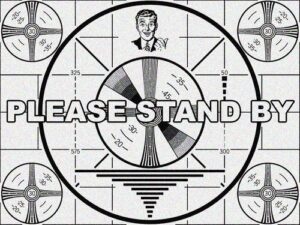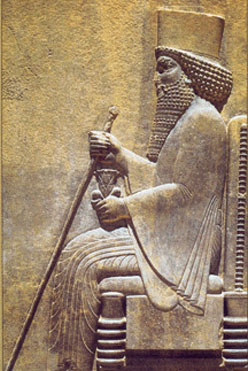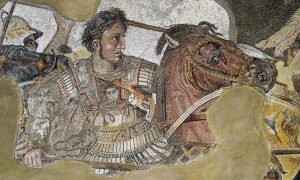AN EXPLANATION, AND AN APOLOGY:
Those of you who follow this blog will know that I was in the middle of a series on Bible translations, which will recommence next week. This week, I have had the blessing to be the preacher at the Summer Leadership Conference at Pittsburgh Theological Seminary. This afternoon, I head for Grove City, PA, where I will teach a Bible study tonight and tomorrow morning called “Opening Doors in Christian Hospitality to All” for Reconciling Ministries, as part of the Lay Academy of the Western Pennsylvania Conference of the United Methodist Church. Plus, grades were due Tuesday. It is all good (well, apart from the grading. . .), but it means that I have not been able to complete my regular weekly blog.
Instead, I would like to share with you the sermon I preached this morning, on Isaiah 50:4-11 (I preached from the NRSV, but I invite you to compare with the CEB in particular), which deals, as it happens, with the issue of translation. The title was, “Whose Tongue?”
A curious translation problem confronts us in the first verse of this passage. The problem is not with the text itself, which seems well-preserved, nor with the word in question, which is fairly common. Instead, translators seem unable to say, straightforwardly, what the text says! The major English translations vary broadly on their reading of leshon limmudim, the gift the Lord has given to the Servant. Leshon means “tongue”–no problem there–but, whose tongue? Is it the “tongue of a teacher” (NRSV), a “skilled tongue” (JPSV), an “instructed tongue” (NIV), or perhaps the “tongue of the learned” (KJV)? Yet, when the same word, limmudim, appears later in the verse, it causes little controversy: “Morning by morning he wakens–wakens my ear, to listen as those who are taught [kallimmudim].” Surely, the same word in the same context should be translated the same way both times. The Servant says, “The Lord God has given me the tongue of those who are taught.”
Perhaps the problem is that Bible translators are usually Bible professors. We believe that teachers talk, and students listen: that teachers should speak from authority. But, is that really so? My own experience as a teacher has taught me that my teaching is most effective when I am most engaged in the material myself: learners teach best! So, too, students learn more when they are actively involved in the process, through discussion, dialogue, projects, and presentations—when, in short, the teacher surrenders authority. The Servant says that the Lord’s gift was given “that I may know how to sustain the weary with a word” (50:4). Surely, a word of comfort comes most effectively not from one who stands above me, but from one who kneels beside me: who shares my sorrow, feels my pain, and offers solace as a fellow sufferer.

In the wake of recent tragedies, from the human-spawned horrors of the Newtown massacre and the Boston Marathon bombing to the devastation wrought by massive tornadoes in Oklahoma, a quote from Fred Rogers has surfaced again and again, going viral on the Web: “When I was a boy and I would see scary things in the news, my mother would say to me, ‘Look for the helpers. You will always find people who are helping.’ To this day, especially in times of ‘disaster,’ I remember my mother’s words, and I am always comforted by realizing that there are still so many helpers – so many caring people in this world.”
In this Song, the Servant appears as a helper. He does not claim authority, but is responsive and obedient:
The Lord God has opened my ear,
and I was not rebellious,
I did not turn backward (50:5).
Far from standing above and apart, the Servant identifies with the outcast and humiliated, to the point of sharing their humiliation and suffering:
I gave my back to those who struck me,
and my cheeks to those who pulled out the beard;
I did not hide my face
from insult and spitting (50:6).
How do you do that? The Servant declares, “The Lord GOD helps me; therefore I have not been disgraced. . . Who are my adversaries? Let them confront me. It is the Lord GOD who helps me; who will declare me guilty?” (50:7-9). The strength and validation of the Servant comes not from himself, or from the world, but from the Lord. This passage is the appointed reading for the Wednesday of Holy Week. But in the Revised Common Lectionary, the reading ends with verse 9, leaving the unfortunate implication that trust in God removes all our difficulties! The Servant relies upon the Lord, but that does not make his path clear, or easy. Instead, the Servant
walks in darkness
and has no light,
yet trusts in the name of the LORD
and relies upon his God (50:10).
When the way is unclear, trust is hard to give. The temptation in dark places is to make our own light, kindle our own torches, become our own guides. But, the Servant warns all “kindlers of fire, lighters of firebrands” who “[w]alk in the flame of your fire:”
This is what you shall have from my hand:
you shall lie down in torment. (50:11).
If we play with fire, we will get burned.
In his book The Crucifixion of Ministry, my friend and colleague Andrew Purves considers the all too common situation of ministers in mid-career, facing a sense of despair, exhaustion, and loss of purpose; what we call “burn-out.” The root problem in our ministry, Purves suggests, is that we think of it as our ministry, not as Christ’s. Only when “our” ministry is crucified, as it must be, can Christ’s ministry flourish in and through us. Only then, as we surrender authority and control, can we join the helpers! Only then can we teach with “the tongue of those who are taught.”

 With the publication of a fragmentary text from Cave 4 at Qumran (called 4QSam a), we now know that this story was part of the text of Samuel: a paragraph that fell out of the text in the course of its copying and recopying over generations. The NRSV of
With the publication of a fragmentary text from Cave 4 at Qumran (called 4QSam a), we now know that this story was part of the text of Samuel: a paragraph that fell out of the text in the course of its copying and recopying over generations. The NRSV of 











 After all, isn’t this the land that God promised to the Jewish people? Aren’t the Arabs—the so-called “Palestinians”—really interlopers, with no real claim on the land? Don’t the Jews have a right to defend themselves, by whatever means prove necessary?
After all, isn’t this the land that God promised to the Jewish people? Aren’t the Arabs—the so-called “Palestinians”—really interlopers, with no real claim on the land? Don’t the Jews have a right to defend themselves, by whatever means prove necessary?